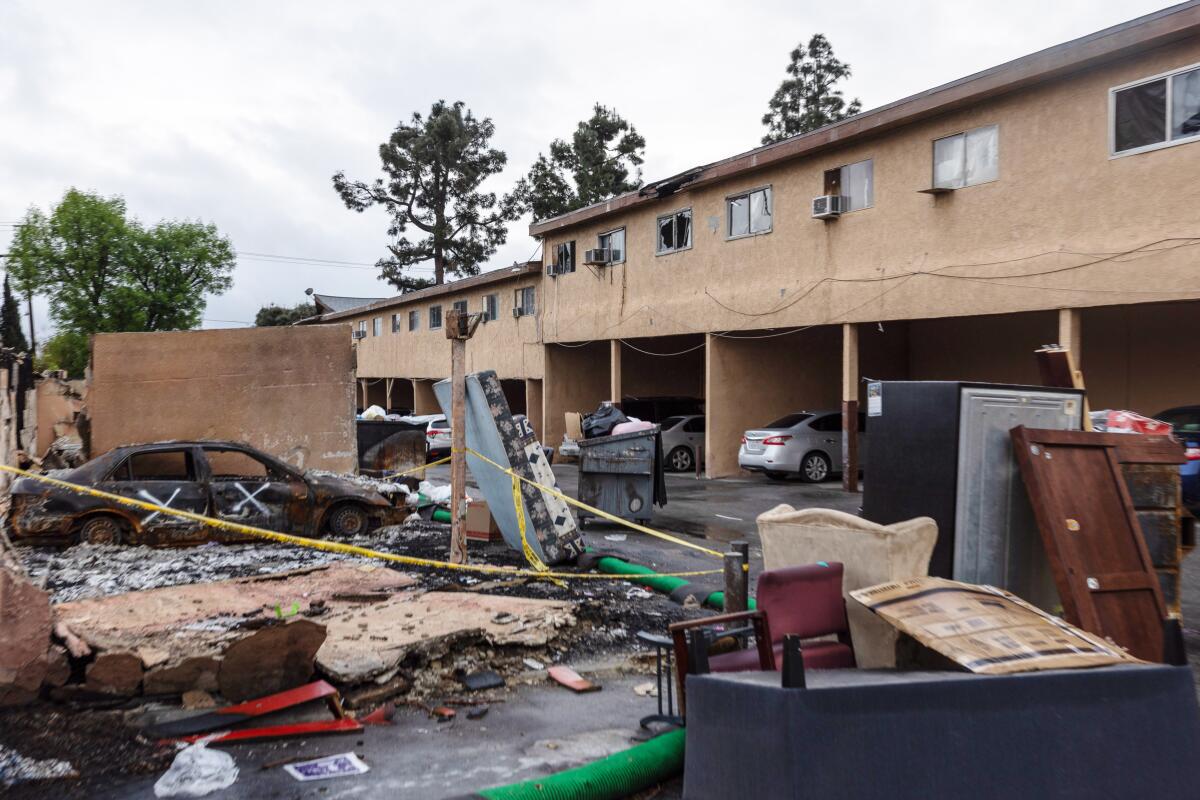In areas near January’s fires, rent is climbing faster than in rest of county

- Share via
Several months after fires tore through Pacific Palisades and Altadena, rent near burn areas is rising faster than elsewhere in Los Angeles County, according to an L.A. Times analysis of Zillow data.
In ZIP codes within three miles of the Palisades fire, rent increased 4.8% from December to April, according to the analysis. Within three miles of the Eaton fire that destroyed swaths of Altadena, rent jumped 5.2%.
In L.A. County ZIP codes farther than three miles of either burn area, the gain was smaller — 2.2%.
Rent could be rising for multiple reasons, experts said, but it’s likely climbing faster near the fires because thousands of homes were destroyed and displaced residents wanted to stay near where they had built their lives, in the process creating a surge of demand in an already drum-tight housing market.
“It doesn’t surprise me,” said Nicole Lambrou, an urban planning professor at Cal Poly Pomona. “You’re looking close to where you were because that’s your community.”
In the weeks after flames broke out, there were widespread reports of landlords illegally price gouging, even raising rent beyond 50%. But there’s been debate over how widespread and long-term the fire effects would be, leading to different responses from different government bodies.
The Los Angeles County Board of Supervisors in February passed eviction protections for many tenants economically affected by the fires, but the Los Angeles City Council declined to take similar measures amid concerns they would hurt landlords.
The Federal Emergency Management Agency hasn’t leased apartments for displaced residents like it has after similar disasters, saying data indicate there is enough housing available.
To conduct its analysis, The Times looked at Zillow rent data at the ZIP code level for single family houses, condos and apartments and compared average rent from December — the month before the fires — to April.
Because seasonal trends tend to push rent up during those months, The Times also compared the change to previous years and found rent grew more in the most recent period — both in areas near the fires, as well as those farther away.
Housing and disaster recovery experts said displacement could be contributing at least somewhat to higher rent in areas more than three miles away from the disaster zones since not everyone has been able to — or wanted to — find housing nearby.
The largest impact, however, seems to be in areas closest to the burn areas, where rent climbed around 5% from December.
Communities included in ZIP codes near the Palisades burn area were Malibu, Santa Monica and Westwood. ZIP codes near Altadena included Pasadena, Arcadia and Monrovia.
In previous years, rent also rose faster in these areas compared with the rest of the county, but the gap grew post-fires, which experts said indicates the fires are the likely cause.
Daniel Teles, a housing researcher with the Urban Institute think tank, said the impact for tenants depends on their own financial situation.
“For a lot of people it’s only a couple of percentage points, but there is a bunch of people who could barely pay their rent as is,” he said. “For them a couple of percentage points is the difference between whether they paid all their bills that month.”
Lambrou said The Times’ findings are consistent with other research, including her own on how disasters affect housing costs. She doesn’t expect rent to come down as the recovery progresses, but said it shouldn’t get much worse since the fires should represent a one-time injection of new demand.
“We are not going to see a constant spike in rental prices,” she said.
Teles said the extent that rent stabilizes in areas near the fires depends on how quickly new housing is built and how many people are still in hotels or other short-term options and will soon be looking for a rental in a tight market.
“If there are still people in transitional housing ... that could continue the effect onward,” he said.
Gladys Clark, a 72-year-old retired teacher, and husband William’s search for permanent housing dragged on for months.
Since losing their home of roughly three decades in Altadena, the couple bounced between several hotels, before moving into an Airbnb in Monrovia.
Clark said they wanted to stay near the memories they built over the years with their five children, 21 grandchildren and one great-grandchild and inquired unsuccessfully about roughly 30 homes near Altadena. One of those they backed out of after the landlord agreed to one price only to raise it $300.
Then, Clark said a client of her daughter reached out with an offer to rent, on a long-term basis, a house in Altadena. They left the Airbnb and moved in last weekend, ideally staying until their house on Grandeur Avenue is rebuilt.
“It was a real difficult time,” Clark said, before thanking God for helping end the months-long search. “I have to give him the glory.”
More to Read
Sign up for Essential California
The most important California stories and recommendations in your inbox every morning.
You may occasionally receive promotional content from the Los Angeles Times.















